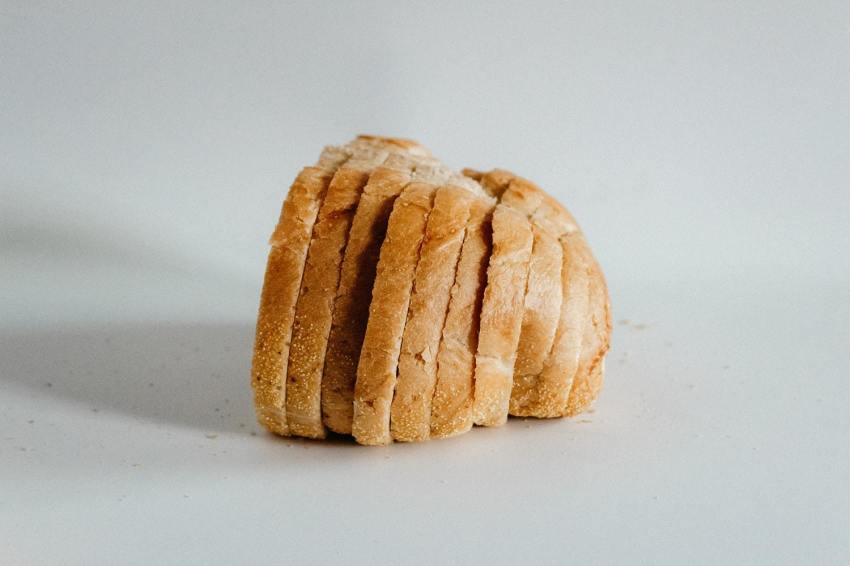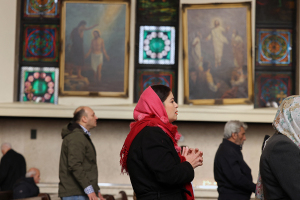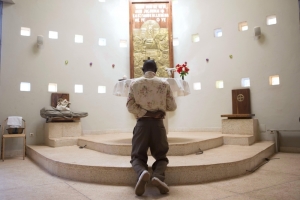Should Christians only work and pray for "daily bread"?

Jesus taught his disciples to pray, “Give us this day our daily bread” (Matthew 6:11) or “Give us each day our daily bread” (Luke 11:3). This raises questions, like: Does God want us to perpetually live hand to mouth? Are we to simply wait for Him to give us our sustenance?
This is a very practical question for many of us. Many of us, I suspect, have not found the career path we were led to expect in life. Lockdowns, inflation, and other factors seems to force us into living paycheck to paycheck. Is it wrong for us to hope and pray for more than just daily expenses to be covered?
While we are to pray for daily bread, stopping there doesn’t seem wise. The ideal wife, according to Proverbs, “laughs at the time to come” (31:25). Solomon warns about consuming too much rather than saving some for later: “Whoever loves pleasure will be a poor man; he who loves wine and oil will not be rich” (Proverbs 21:17 ESV). The ant is commended for appearing to gather bread while it is available and save it for later (Proverbs 6:8).
One story in the Bible seems especially illuminating for how we should think of daily bread: the Book of Ruth. That story is all about bread. An Israeli family—a couple with their two sons—leave their home in the region of Bethlehem (literally: “house of bread”) to go seek their fortunes in Moab. As is revealed later, to make this relocation possible, they had to sell their fields to buyers outside of their extended family. The reason for the move is basic: Israel is suffering from famine. Bethlehem is not living up to its name so they are trying to make a living elsewhere.
In the following decade both of the sons marry non-Israelite women but then all three men in the family die. The surviving widow, Naomi, is left without anyone to help her provide for herself and without any hope of a future. She tells the widows of her two sons to go back to their fathers’ homes in the hope of remarrying and starting families. One does so but the other, Ruth, absolutely refuses: “Do not urge me to leave you or to return from following you. For where you go I will go, and where you lodge I will lodge. Your people shall be my people, and your God my God. Where you die I will die, and there will I be buried. May the LORD do so to me and more also if anything but death parts me from you” (Ruth 1:16–17 ESV).
So Naomi and Ruth return to a dire future of subsistence labor and poverty. Bethlehem is now prospering, but the land that her family once owned is unavailable to them. Naomi states emphatically that God has ruined her. While I’m sure Ruth’s presence was comforting to her, it probably hurt Naomi to see her daughter-in-law share in her poverty and destitution.
But everything changed because Ruth pursued daily bread: “Ruth the Moabite said to Naomi, ‘Let me go to the field and glean among the ears of grain after him in whose sight I shall find favor.’ And she said to her, ‘Go, my daughter.’” (Ruth 2:2 ESV).
Gleaning was an institution in Israel that was supposed to help poor Israelites and foreign refugees (Deuteronomy 24:19-22). It involved hard toil, because to glean you were basically working as a harvester for a meal or two.
Naomi didn’t realize that Boaz, a relative of hers, had the means and the willingness to help her out. It had been ten years since she had left Israel. Boaz may have come into his inheritance after she left, or he may have been much poorer in earlier days and prospered more recently. Whatever the explanation was, she had no idea that Boaz had great potential as a close kinsman of her family. She was so ignorant that it never occurred to her to mention him to Ruth or tell her to look for his fields.
So God’s rescue of Naomi took the form of “luck.”
“So she set out and went and gleaned in the field after the reapers, and she happened to come to the part of the field belonging to Boaz, who was of the clan of Elimelech” (Ruth 2:3 ESV).
That “chance” decision to enter Boaz’s field changed hers and Naomi’s life. Boaz was impressed with Ruth and made sure that her work in the field was rewarded with a substantial amount of grain. As soon as she brought the day’s gleanings to her mother-in-law, Naomi asked what property-owner had showed her so much kindness. And when Ruth told her, here response was dramatic: “May he be blessed by the LORD, whose kindness has not forsaken the living or the dead!” (Ruth 2:20 ESV)
Naomi goes on later to hatch a plan to have Boaz marry Ruth and redeem their land for Ruth’s firstborn son to inherit as their heir of Naomi’s dead husband. But none of that great and prosperous future would have happened if Ruth hadn’t been willing to pray and work for nothing more than daily bread.
No one likes working just to stay afloat and put food on the table. But you never know where that eventually may lead. God wants us to pray and work for daily bread but he also wants us to hope and pray it will lead to something better.
It is certainly more likely to lead to something better than what will happen if you stay home and do nothing.
Mark Horne has served as a pastor and worked as a writer. He is the author of The Victory According To Mark: An Exposition of the Second Gospel, Why Baptize Babies?,J. R. R. Tolkien, and Solomon Says: Directives for Young Men. He is the Executive Director of Logo Sapiens Communications and the writer for SolomonSays.net.



























